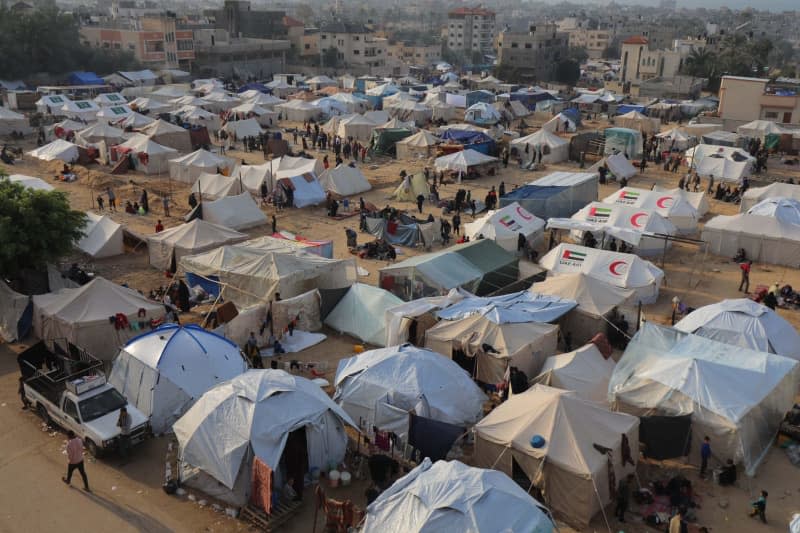Israeli army expresses regret for airstrike on Gaza refugee camp

The Israeli army has expressed regret over the "harm to uninvolved individuals" caused by a recent strike on the al-Maghazi refugee camp in the central Gaza Strip.
The December 24 attack on the urban refugee camp left dozens of people dead. The Hamas-run Health Ministry put the toll at more than 70, with children among the victims. UN officials spoke of 86 killed.
More than 33,000 people live in al-Maghasi, which covers an area of 0.6 square kilometres, according to the UN.
An Israel Defense Forces (IDF) spokesman said on Thursday that fighter jets had "struck two targets adjacent to which Hamas operatives were located on December 24."
"Before the strikes were carried out, steps were taken by the IDF to mitigate harm to uninvolved civilians in the area," he continued.
"A preliminary investigation revealed that additional buildings located near the targets were also hit during the strikes, which likely caused unintended harm to additional uninvolved civilians."
The incident is now being dealt with by a special committee within the army, which is responsible for investigating "exceptional incidents that occur during combat."
Israel's KAN broadcaster reported, citing an unnamed military official, that the investigation had revealed that the appropriate ammunition was not used in the attack, leading to the extensive damage.
"This could have been prevented if the right ammunition had been chosen for the operation," the broadcaster reported.
According to Gaza health authorities, more than 21,320 people have been killed in the Palestinian territory in the fighting so far.
Aid organizations are repeatedly warning that the humanitarian situation in the narrow coastal strip on the Mediterranean Sea has reached catastrophic levels.
Forty percent of the civilian population in Gaza is threatened by famine, according to a UN refugee agency.
"Every day is a struggle for survival, finding food and finding water," Thomas White, Gaza director of the United Nations Relief and Works Agency for Palestine Refugees in the Near East (UNRWA), was quoted as saying on X on Thursday.
"Gaza is grappling with catastrophic hunger. 40% of the population are now at risk of famine," the UNRWA said.
"The reality is, we need more aid. The only remaining hope is a humanitarian ceasefire."
Israel has repeatedly said that it is allowing enough aid supplies into the sealed-off coastal strip, while accusing UN organizations are failing to distribute them. Israel also alleges that Hamas is stealing aid deliveries.
Hamas, which seized control in Gaza by force in 2007, is designated as a terrorist organization by Israel, the United States and the European Union.
Ten more people were killed and a dozen injured in a new Israeli attack on a building near a Khan Younis hospital in southern Gaza, the Palestinian Red Crescent said on Thursday morning.
The rescue service had already reported of more than 20 dead in an airstrike on a residential site near the al-Amal hospital on Wednesday.
An IDF spokesman said the reports were being investigated.
Israel suspects that Hamas' leadership is hiding in Khan Younis in southern Gaza, an area were many civilians were told to flee after the IDF began its campaign to eliminate Hamas from Gaza following the October 7 attacks.
October 7 saw the worst massacre in Israeli history, with militants from Hamas and other extremist groups rampaging through Israeli border communities and killing some 1,200 people, most of them civilians.
Some 240 people were abducted into the Gaza Strip. Some of them were released as part of a temporary truce agreement.
Israel responded by pounding densely populated Gaza with aistrikes ever since. The IDF also launched a ground offensive into the sealed-off Palestinian territory in late October that has been pushing farther south.
An Egyptian official said on Thursday that Cairo had recently proposed a plan to halt the war but has not yet received any responses.
"The proposal includes three successive and linked stages, ending with a ceasefire," Dia Rashwan, the head of the State Information service, Egypt's state media organization, said.
The proposal was drafted after Cairo listened to views of all parties concerned, he said without elaborating.
"Upon receipt of responses from the parties concerned, the proposal will be elaborated in detail, and will be announced in full," Rashwan said in an online statement.
Last week, a Hamas delegation led by its chief Ismail Haniyeh visited Cairo for talks with Egyptian officials, the group said.

